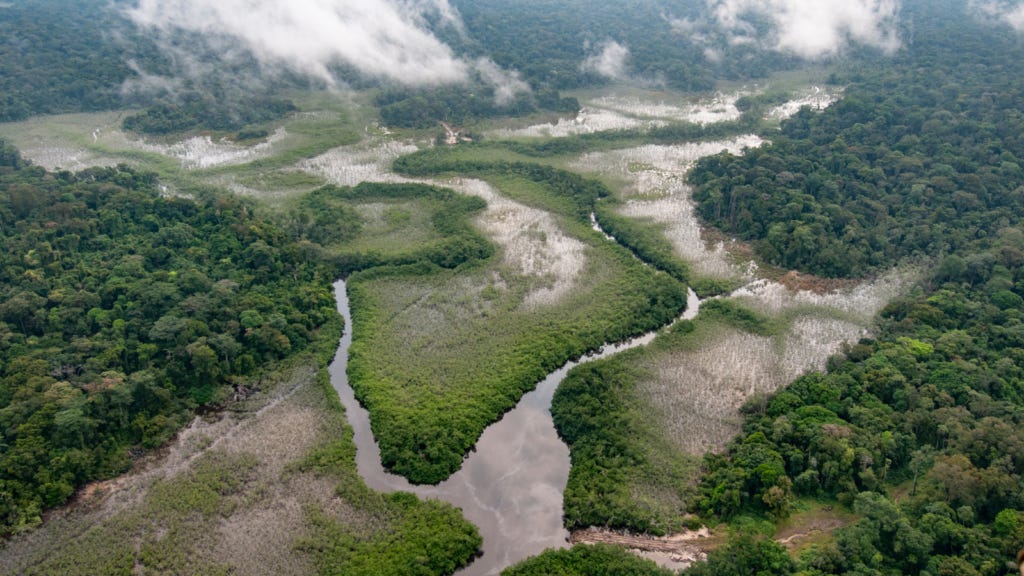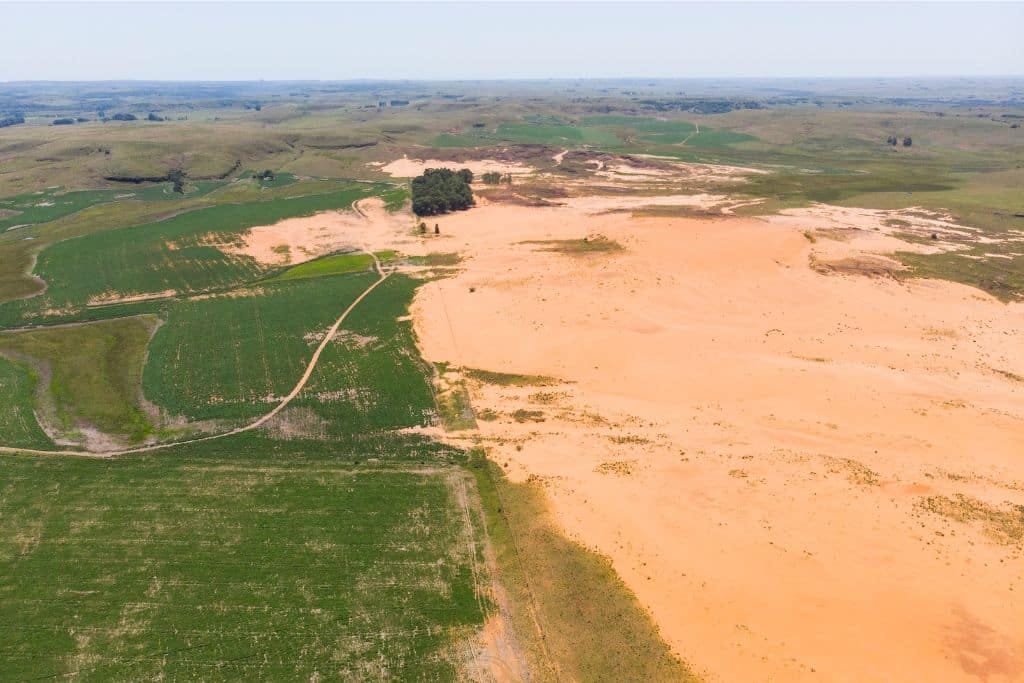Investing in Nature: Introduction to Land-Based Ecosystems in Sub-Saharan Africa
Context and Investment Insights - Exploring 9 Priority Areas for Climate Action
Dear all,
Thank you for the positive feedback on our deep-dive into Agriculture & Food Systems. Today, we delve into the second priority area outlined by the African Union to combat climate change:
#2: Protecting Land-Based Ecosystems

🕐 In a Hurry? Here's a 1-Minute Summary:
Context: Africa, the world's second-largest continent, hosts diverse ecosystems, from deserts to tropical rainforests and vast grasslands. These ecosystems are crucial for global carbon storage, biodiversity protection, and climate control. The Congo Basin alone stores around 29 billion tons of carbon, nearly one year worth of global carbon emissions.
Decline: 46% of Africa’s total land area is degraded. The ecosystem decline is driven by factors like agriculture, extreme weather events, illegal activities, and deforestation, contributing to desertification and soil erosion.
Consequences: The consequences are far-reaching, intensifying climate change, displacing communities, exacerbating food insecurity, and increasing the risk of diseases like COVID-19.
The Future: Africa's ecosystems play a vital role in climate change mitigation. Restoration efforts, like the Great Green Wall and the Africa Forest Landscape Restoration Initiative are promising. But substantial investments are needed: Alone to restore the Sahel region it would cost an estimated $40 billion.
Investment Insights: The investment market for nature ecosystems in Africa is showing promising signs of growth. We’re excited about businesses active in agroforestry, carbon credit generation, waste management, water management, and ecotourism, each offering both environmental benefits and financial returns. Scroll down for an overview of active investors, and further reading.
⏳ Ready for a Deeper Dive? Here's the Breakdown:
Context: Key facts and figures
Africa, the world's second-largest continent, spans 30 million square kilometers, making it three times the size of Europe.
(1) Africa’s diverse ecosystems
Deserts: From the Sahara in the north, the world's largest hot desert covering around 25% of the continent, to the Namib-Kalahari in the southwest.
Tropical Rainforests: Encompassing the Congo River basin, the world's second-largest rainforest after the Amazon.
Grasslands and Savannas: Covering approximately half of the continent, including iconic landscapes like the Serengeti and Maasai-Mara.
The Congo Basin, often called Africa's "lungs," is vital for global carbon storage, biodiversity protection, and climate control. This lush region is one of the world's largest carbon sinks, holding around 29 billion tons of carbon. This is approximately equal to the total annual carbon emissions worldwide in a year (around 37bn tons in 2022). Annually, it absorbs net around 0.6 billion metric tons of CO2.
(2) Ecosystem Decline: Rapid Environmental Loss
Land degradation in Africa has reached alarming proportions, affecting an estimated 46% of the continent's total land area. This widespread degradation comes at a staggering annual cost of $9.3 billion, and impacts 485 million people. Within this crisis, some key factors stand out:
🏜️ Desertification: A substantial portion of Africa, roughly 45% of its land, is affected by desertification, with approximately 55% of this land at high risk of further degradation. The Sahara Desert, for instance, is expanding southward at a rapid rate of 48 kilometers per year, partly due to human influence.
🌳 Deforestation: Africa is the world's third-largest continent in terms of forested area, but nearly 4 million hectares of trees are lost annually. This rapid tree loss threatens biodiversity and exacerbates climate change.
(3) Causes: A Vicious Cycle of Land Degradation
Land degradation is primarily driven by agriculture, exacerbated by extreme weather events and illegal activities such as mining and pollution. Expanding agriculture contributes to deforestation, a key factor in desertification and soil erosion. Extreme weather events like flash floods and droughts increase the risk of soil erosion, as the absence of trees and their stabilizing roots leaves topsoil vulnerable.
For example, Africa, a major cocoa and palm oil producer, requires vast land areas for cultivation. A visualization by the World Cocoa Foundation and Mighty Earth illustrates the dramatic impact of cocoa production on forests in Côte d'Ivoire over 25 years.

Additional drivers of land degradation include illegal timber logging for construction, furniture, and pulp production, as well as charcoal production for cooking fuel, and urbanization.
(4) Consequences: Devastating Impact on People, Nature, and Wildlife
The destruction of ecosystems intensifies climate change, leading to more frequent droughts, floods, and habitat loss. Entire communities, numbering in the millions, are displaced, spurring migration and territorial conflicts. This disrupts agriculture, exacerbates food insecurity, and increases the risk of zoonotic diseases like COVID-19.
The tangible effects of this crisis are painfully evident in recent headlines:
(5) The Future: African Ecosystems’ Crucial Role in Climate Change Mitigation
Africa's ecosystems hold immense carbon storage potential, making their protection paramount. Peatlands, grasslands, and forests are carbon reservoirs, but when destroyed, they release significant carbon emissions. Thus, preservation should be our top priority.
Sub-Saharan African nations lead global commitments to ecosystem restoration, involving tree planting, water conservation, and sustainable agriculture practices.
However, realizing these goals requires financial investment, with the restoration of the Sahel region alone estimated at $40 billion. Notable initiatives include:
The Great Green Wall: Initiated in 2007, this project seeks to restore 100 million hectares of degraded land, capture 250 million tonnes of CO2, and create 10 million jobs by 2030. By 2023, about 18% of the target had been reached despite challenges.
Central African Forest Initiative: Backing countries in green, low-emission development, funding diverse projects for policy, forest monitoring, and community engagement, preserving carbon-absorbing forests and biodiversity hotspots.
Africa Forest Landscape Restoration Initiative (AFR100): A country-led effort to restore 130 million hectares of degraded land by 2030 through reforestation, agroforestry, and mangrove restoration, among other strategies.

Investment insights
(1) Market: Promising signs of growth
The investment market for nature ecosystems shows promising signs of growth and interest from various stakeholders.
Rising Interest in Conservation and Sustainable Practices: Growing global awareness among governments and impact investors of the importance of preserving African ecosystems.
Government Initiatives: Several African governments are recognizing the economic and ecological value of their natural ecosystems and are implementing policies to promote conservation and sustainable resource management.
Carbon Credits and Ecosystem Services: Growing opportunities related to carbon credits and ecosystem services.
Technology and Innovation: Advancements in technology, including satellite imagery, blockchain for tracking supply chains, and data analytics, are used to monitor and manage ecosystems more effectively, which facilitate nature-based investments.
"Debt-for-nature swaps": In simple terms, it means a country's debt gets bought by a bank or investor and replaced with cheaper debt, often with help from a development bank's "credit guarantee" or "risk insurance." The money saved is then used for conservation.
(2) 5 Investment Areas We’re Excited About
Investing in companies that preserve and restore African ecosystems can be a win-win, delivering both environmental benefits and financial returns. Here are 5 promising investment areas:
Agroforestry: Businesses that combine agriculture with tree cultivation on the same land. This synergy creates diversified income streams while safeguarding ecosystems through erosion control and biodiversity conservation.
Carbon Credit Schemes: Businesses and projects producing high-quality carbon credits e.g., through reforestation, afforestation, or sustainable land management. Each carbon credit represents the mitigation of one metric ton of carbon dioxide or its equivalent aligning profits with the preservation of our planet.
Waste Management: Sustainable waste management and recycling companies that tackle environmental challenges while generating revenue: From waste-to-energy technologies that reduce soil contamination to recycling plants that combat deforestation.
Water Management: Water management companies that benefit ecosystems by protecting water quality. Companies involved in water treatment that ensure water released back into natural ecosystems remains clean and free from harmful pollutants.
Ecotourism: Sustainable ecotourism businesses that maintain natural environments to attract tourists and use revenues to fund vital conservation efforts.
(3) Investors Leading the Way
Selected active investors and initiatives driving investments into “natural capital”
Mirova investments focus on ecosystem conservation, restoration, and supporting local communities.
PE fund Moringa invests in sustainable agroforestry in Sub-Saharan Africa and Latin America.
Okavango Capital Partners is dedicated to mitigating climate risks and biodiversity loss in Africa's vital ecosystems.
African Natural Capital Alliance is a collaborative platform working to involve the financial sector in addressing nature loss in Africa.
Climate Investment Funds has already invested in 21 countries across Sub-Saharan Africa e.g., with its Forest Investment or Nature, People & Climate Program.
Sources to learn more:
State of Finance for Nature 2022 - UNEP Report
Natural Capital for Climate Finance and Green Growth in Africa 2023 - African Development Bank
Nature-based green infrastructure: A review of African experience and potential - ODI Report, June 2023
Financing for Natural Capital in Africa - FSD Africa, September 2022
Africa Open D.E.A.L. - UN FAO, July 2021
Enjoying out content?
Don’t keep it for yourself and share!
Subscribe to not miss future updates!
Feedback or thoughts?
Please let us know! Just reply to this e-mail. We’re happy to hear from you!
Thanks for reading,
Carolin
Disclaimer: All information provided is not intended to serve as investment advice. Any mention of industries or countries should not be taken as an endorsement.






